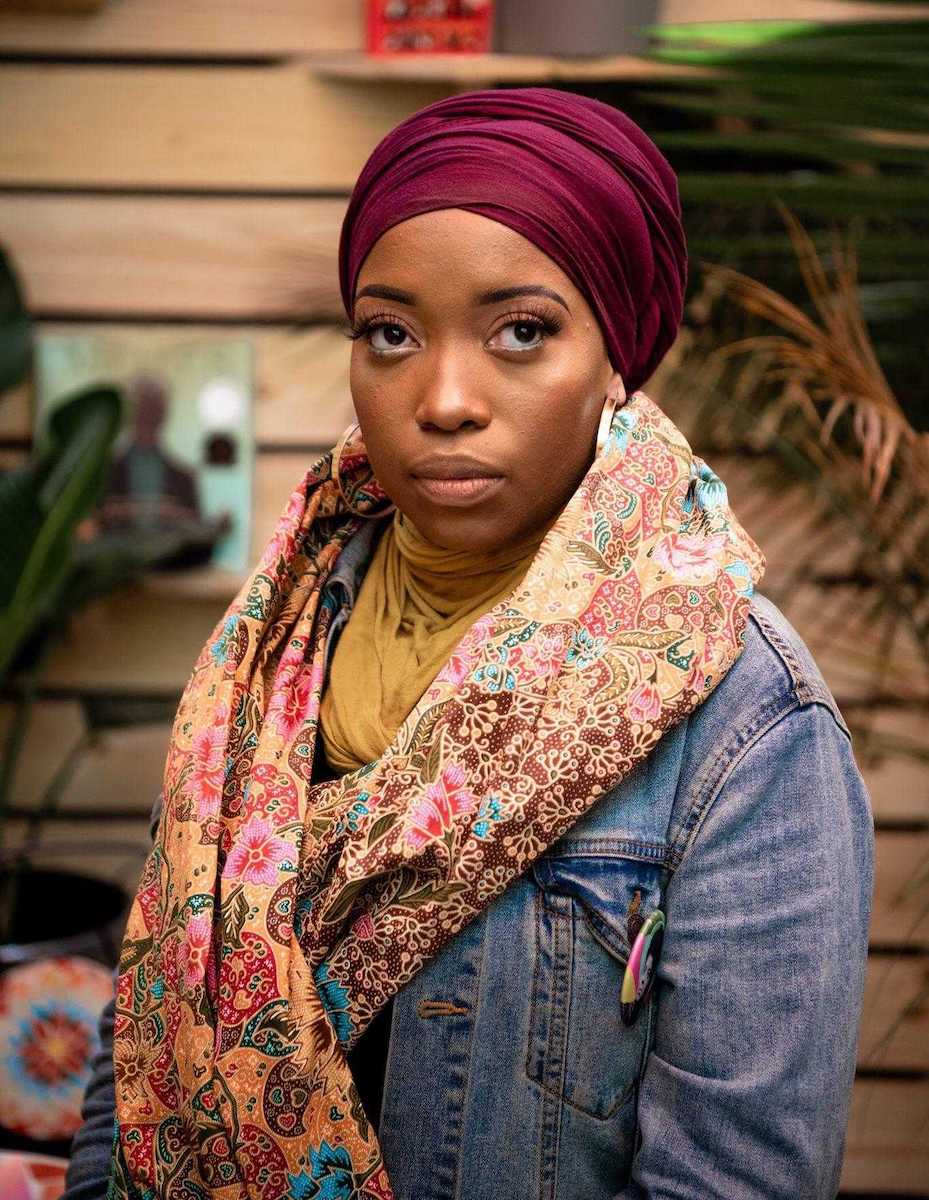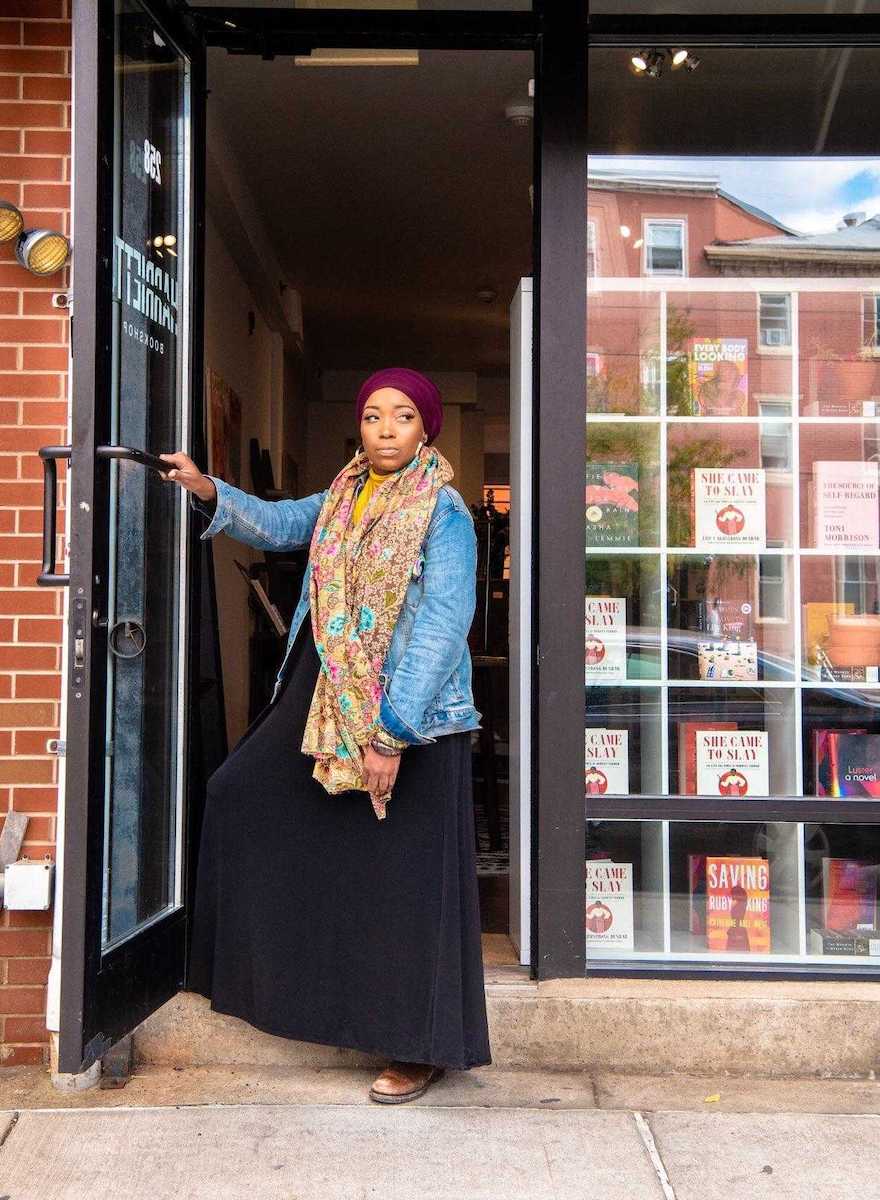Cook’s mother emigrated to the United States from Trinidad when she was 16 and always had extra side projects in addition to her day jobs. In their household, having multiple streams of revenue represented the opportunities that came with life in the United States.
“My mother always had a side hustle,” she told Technical.ly. “She would be selling hats at church and [also worked as] an event coordinator. She was one of those people that does multiple jobs. There’s a stereotype that Caribbean people have multiple hustles and that was the environment I was raised in. In high school, I braided hair and babysat.”
Cook was born in Brooklyn before moving with her family to Hampton, Virginia as a youth. Moving to Philadelphia to attend college at the University of the Arts would quickly test her problem-solving skills and entrepreneurial spirit.
As a UArts alumna that never lived on campus and preferred life in the local community instead, she worked to find ways to give local kids access to arts supplies. “I noticed the children on my block didn’t have access to things, so I rented out equipment and let them use it every weekend,” she said. These efforts became Positive Minds, a club she started at the university with the community in mind.
To raise money for Positive Minds projects, Cook and her peers sold books in front of the UArts campus. She began to see entrepreneurship as a way to solve community problems.

During her time at the UArts, Cook participated in an entrepreneurship bootcamp. Participation in the bootcamp was supposed to culminate with the application for a $10,000 grant to launch a biz, but after two summers had passed, the opportunity was no longer available to alumni when Cook tried to get the grant because of a rule change in the program.
After graduating college, Cook sold books and and incense near Temple University at the corner of Broad Street and Cecil B. Moore Avenue, an experience that taught her business intangibles she relies on today. Using a table with a box and a large bin to carry her books and inventory, she quickly learned how to engage with customers, manage her product selection and build her business. It was there that she learned books could be the catalysts for great discussions among different people.
As a single mother who has experienced poverty before, Cook believes that innovation is born out of necessity. But COVID-19 would take her idea of innovation to a different level.
Cook opened Harriett’s Bookshop, the Fishtown store highlighting women authors, artists and activists, at the beginning of 2020 — and served customers for little more than a month before having to shut down because of COVID-19. As a result, the store’s life cycle has run parallel to the length of the pandemic and she had to respond fast.
In a move reminiscent of her days selling books outside near Temple, she and her team moved all of the store’s furniture outside and rebuilt the store on the sidewalk in front of the store. Since then, the sidewalk sales have helped Harriett’s stay afloat with customers providing constant support that included a lively Juneteenth celebration.
“COVID is all we know,” she said. “We opened in February and had to shut down in mid-March. Our whole existence has been with COVID by our side in some way. Also, the uprisings across the country have had an effect on our business as well. We’ve only known the roller coaster.”

Cook believes listening to entrepreneurs of colors’ needs is one of the biggest things organizations and firms can do to support them. When the Paycheck Protection Program and other U.S. Small Business Association loans were announced at the start of the pandemic as COVID-19 business relief, Cook was concerned that her business would not receive anything: Harriett’s had only existed since February and didn’t have a full year of tax paperwork to submit yet. For answers, she reached out to Councilperson Mark Squilla, who presides over the Fishtown neighborhood that Harriett’s calls home.
“We had connected our small businesses to [the City of Philadelphia’s Department of Commerce] for grants and low interest loans,” Squilla told Technical.ly via email. “We especially pushed Commerce for our minority-owned shops. We also worked through Commerce to help with state and federal programs.”
Indeed, back in March, the commerce department teamed up with PIDC to create the COVID-19 Small Business Relief Fund to help small businesses survive the public health crisis. That fund consisted of three relief programs, a mix of grants and loans varying in size depending on a business’ revenue. Since then, the City and other Philadelphia institutions have offered a number of grants and loans for impacted small businesses, including minority-owned businesses. Cook ultimately applied for and received a Small Business Assistance grant through PIDC.
It’s so important to have time where you listen to your internal voice and listen for what it’s saying to do and then do the thing that it is saying.
One of the issues Cook has with potential funders seeking to help Black and Latinx businesses is the immense number of questions that come with inquiries. Responding the inquires and compiling the information needed can be a Herculean task and take away from the time that entrepreneurs like her have to invest in their businesses.
“Make your process more streamlined and easy to access,” she said. “I think we’re in the 21st century and some of this stuff can be streamlined. We’re doing things in the old ways. Some of this stuff does not require all of that.”
The nation’s recent racial uprising have had concerning results for local Black-owned businesses. In September, Harriett’s was one of at least 10 local Black-owned businesses that received an email with threats of sexual violence against owners, their employees and family.
“I’m in this building by myself most of the time,” she said. “I have three high school interns and two are girls, so the challenge becomes one of safety and one of resilience. What do you do in the face of that type of hate? I would’ve never thought we’d be the targets of that hate. I thought of Marc Lamont Hill’s [Uncle Bobbie’s Cafe and Books] being broken into over and over again. The challenge is making sure we’re all safe.”
Referencing a recent Martin Luther King Jr. documentary she saw at this year’s Philadelphia Film Festival and the lack of justice following the killing of Kentucky’s Breonna Taylor by police, Cook expressed her own distrust of the police. As a mentor to her young interns, she has struggled with showing them ways in which we live in a progressive society when racism is still so pervasive.
On Monday, Oct. 12, Cook organized a theatrical sit-in in response to the racist emails at a restaurant near her bookstore. Over the course of 90 minutes, she dressed like a woman from the 19th century and with her sister Jasmaine Cook as emcee, held a discussion on the Middle Passage and other topics relative to the past, present and future of members of the African diaspora.
Using her bookstore’s namesake in freedom fighter Harriett Tubman for inspiration, Cook believes teaching others how to succeed as entrepreneurs is an invaluable tool. Cook also worked as an educator earlier in her career.
“When I think about Harriett Tubman who we’re named for, [she] was an entrepreneur. This was a woman that had a brick-making business. When she brought people out of slavery she would also train them to be their own entrepreneurs. It was designed so they wouldn’t have to be domestic workers.”
Ultimately, Cook said she would like to have conversations with the Chamber of Commerce for Greater Philadelphia or other organizations that offer resources to Black entrepreneurs. For now, she will continue to rely on her intuition. It has not steered her wrong yet.
“It’s so important to have time where you listen to your internal voice and listen for what it’s saying to do and then do the thing that it is saying,” she said. “When we first did our sidewalk sale, something told me to take one table outside. It wasn’t a guide, it was something that came to me.”
###
Resources:







